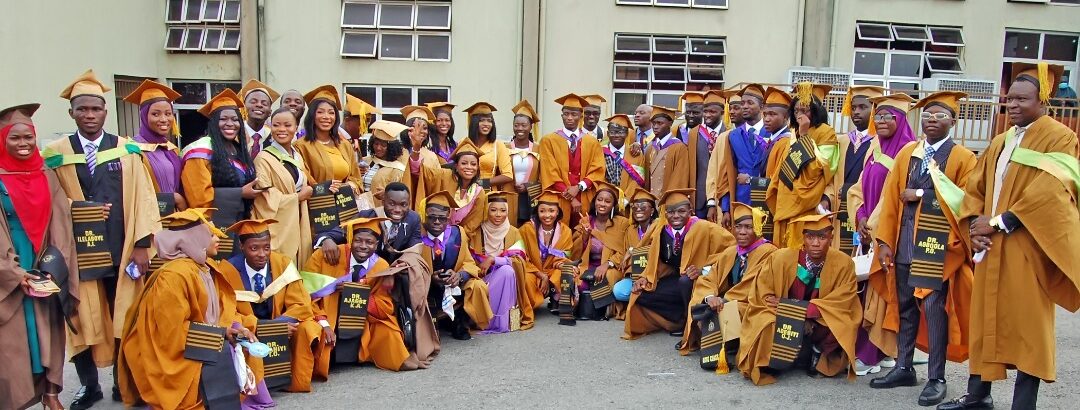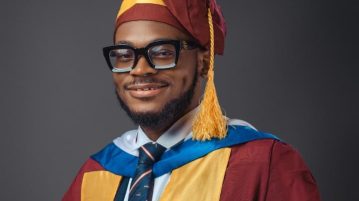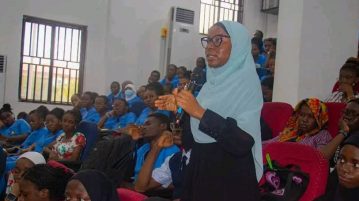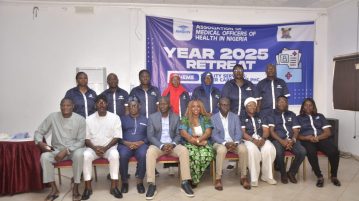On the 11th of November 2022, the Ladoke Akintola University of Technology (LAUTECH) held its 17th induction ceremony for her graduands into the medical profession, since inception.
However, this is the first induction done since the University (LAUTECH) became fully owned by the Oyo state government in 2020. And it happened in a space of about 6 weeks following the completion of their final professional MBBS exams. Before now, it took an average of 10 years to complete medical school in LAUTECH, due to general ASUU strikes and some other internal strikes and clashes between the initial 2 owner states – Oyo and Osun. Although, inductions were usually faster, taking place on an average of 2 weeks after the final exams.
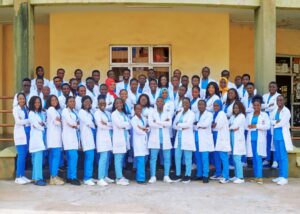
This induction ceremony which held in Ogbomosho, at the university’s College of Health Sciences 1500LT, for the class named “MAGNIFICUS”, inducted a total of 63 out of the 75 students originally admitted in 2014. And among the inductees was the best graduating student – Dr. Ilelaboye Ayodeji – who broke record by being the first student in the history of the College of Health Sciences (COHS), LAUTECH to get a distinction in Internal Medicine. He also graduated with distinctions in Surgery, Pathology, Obstetrics and Gynaecology.
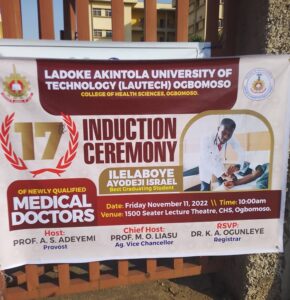
After the official ceremony, during our interview with one of the freshly inducted medical doctors – Dr. Amoo Oluwadamilola – discussing their challenges and experience through the course of their training, she explained: “My class was admitted to the medicine and surgery department of the school after several years of pausing admission due to lack of MDCN accreditation. So, our seniors were many years ahead of us. That by the time we started medical school, there was a significant form of disparity between our realities and that of the next class. Though some seniors tried to bridge the gap, we still had to figure out a lot of things on our own; for ourselves and for juniors coming after us, as the school’s admission process continued. Most of the materials we got, including lecture notes and question banks were from about 5 years ago. Even some of the lecturers who taught our seniors were no longer available. By the time we got to 400L (the beginning of clinical school), it became more challenging; we were on our own, as the last batch of our available senior class graduated. We had to rely on the advice and little experiences we had with them on clinical postings to learn – how to relate with our teachers, patients and other health workers as medical students. As well as how to manage other extracurricular activities such as student politics, leadership skills, personal, career and social development projects and religious responsibilities, in order to retain our relevance amongst other medical students’ associations across the country”.
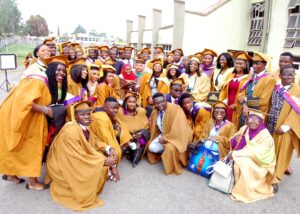
She also shared some of the great groundings and influence they had as a class: “My class’s strength is embedded in our ability to understand our realities, our available resources (especially human) and how to utilize them to achieve our goals. We knew those who were very close to other seniors and utilized them to get advice when we needed them. We knew those who had connections to authorities and utilized them to relay our administrative needs. We knew the brilliant and assiduous ones and utilized them to keep the academics of the class in good shape. We knew those who are vast in extracurricular activities and put them forward to preserve the image of the class and that of the medical school. Some of my classmates had the “mentorship bone” in them and took care of our juniors. We shared materials, resources, knowledge and ideas freely. We were open to one another and genuinely loved and helped one another. We were warned of factions due to religious, political and personal differences, still we made sure that everyone stayed united”.
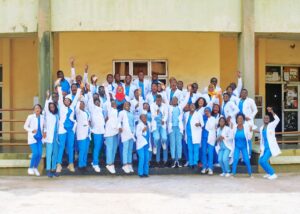
Notably, during the induction ceremony, the MDCN registrar mentioned that there are over 500 vacancies for house officers across the country, and this is largely due to the mass emigration of Nigerian doctors in search for greener pastures. He then encouraged the young doctors to serve the country rather than worsening the brain drain.
Furthermore, he also pointed out to the University’s Acting Vice Chancellor, the importance of restructuring the medical school system. Such that, medical students are taught by doctors, whether it be basic medical, pathology, pharmacology or clinical courses. He emphasized that the faculty of medicine should be to train doctors and not scientists.
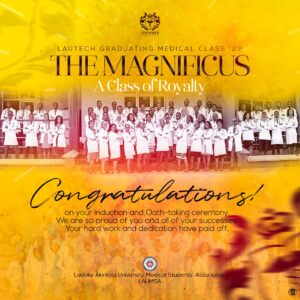
“Together, we were able to overcome the challenges we faced as a class and now we’re coming out as Victorious. Hence, our name “The MAGNIFICUS”, which fits us truly. We were – and still are – truly a class in a class; that is full of royalties, potentials and passion, which taught us to use them for the common good”. ~ Dr. Amoo Oluwadamilola

